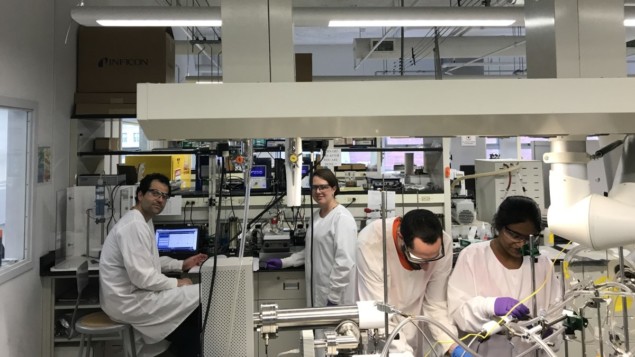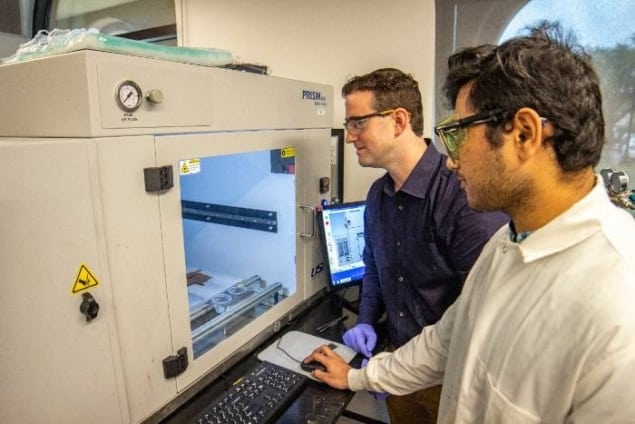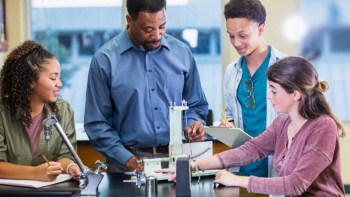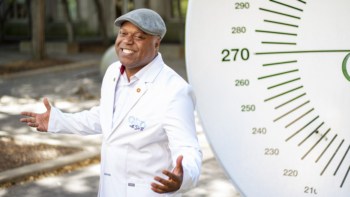Toyota has joined forces with The Electrochemical Society to support young scientists and engineers who are investigating more sustainable solutions for the automotive sector

One of the biggest challenges in tackling the climate crisis will be to clean up our transportation networks. Electric vehicles already offer a viable route to zero-emission road travel, but more innovation is needed to build better batteries that enable longer journeys and faster charging – and all within an affordable price tag. Meanwhile, hydrogen-powered fuel cells promise high-energy densities and rapid refuelling, and could offer an emission-free solution for heavy-duty transport such as commercial trucks and aviation, but the cost and durability of these systems remain major barriers to widespread market acceptance.
Those critical challenges will require inventive and practical solutions, which is why automotive manufacturer Toyota has teamed up with The Electrochemical Society (ECS) to award a series of research fellowships focused on the development of green-energy technologies that reduce both pollution and carbon emissions. Launched in 2015, the ECS Toyota Young Investigator Fellowship programme has so far awarded some $1.2m in research funding to 19 early-career academics, with each individual receiving at least $50,000 for a one-year research project. Applications for the 2022/23 fellowships are now open until 31 January 2022.
“The fellowship was a fantastic opportunity,” comments Elizabeth Biddinger of The City College of New York (CCNY), who was one of the first fellows to benefit from the scheme in 2016/17. “It kick-started my work on batteries, and what we learnt about electrolytes during that project has enabled me to participate in other major research programmes.” Biddinger is now a co-investigator in the NASA–CCNY Center for Advanced Batteries in Space, a $3m research grant awarded to CCNY in 2019 to study novel electrolytes in metal-anode batteries for use in extreme environmental conditions.
Biddinger also formed some useful collaborations during her fellowship year, not least with a new member of her own faculty who is now the lead investigator on the NASA project. “I enjoyed the experience of interacting with ECS and Toyota,” she says. “I was able to find out about Toyota’s research on novel batteries, and gain an understanding of the challenges and priorities not just for them but for the industry as a whole.”
Building stronger links between talented academics and major industry players is a key goal for the ECS. “The ECS Toyota Young Investigator Fellowships play a vital role in connecting the Electrochemical Society’s global community of renowned researchers, scientists and scholars with the industrial might of one of the world’s premier vehicle manufacturers,” comments Christopher J Jannuzzi, the executive director and CEO of the ECS. “We are proud to partner with the Toyota Research Institute of North America (TRINA) to ensure that the fellows’ brilliant research is properly funded and nurtured to foster sustainability solutions for all.”
That collaboration with Toyota has been particularly important for Christopher Arges at Pennsylvania State University, who is one of the current cohort of 2021/22 fellows. Arges plans to study high-temperature polymer electrolyte membrane fuel cells (HT-PEMFCs), which are an attractive alternative to low-temperature versions because they simplify heat management and cooling of the fuel-cell stack, as well as solving many challenges associated with water management – such as preventing electrode flooding. He hopes to re-engineer the ionomer binders, which hold together the porous electrode materials and shuttle protons to and from the electrocatalyst surfaces, with the overall aim of lowering the operating temperature of the HT-PEMFC from more than 200 °C to 120–160 °C.

“Toyota is a leader in fuel-cell technology for vehicles, and they have a lot more knowledge than I do about the requirements for fuel cells in the automotive sector,” comments Arges. “The scientists and engineers at Toyota have explained why this technology is important and what needs to be done, and their input has opened up a whole new dimension for our research.”
For Toyota, meanwhile, the fellowships provide direct access to novel ideas and approaches that they may not be able to pursue through their internal R&D programmes. “Toyota hopes to encourage young professors and scholars to pursue innovative research in sustainability while at the same time connecting these up-and-coming scientists with Toyota professionals,” comments Timothy Arthur, principal scientist at TRINA.
The scope of the fellowships is broadly aligned with the company’s strategic interests of batteries, fuel cells and hydrogen, and future sustainable technologies. However, fellowships have supported inventive ideas in related areas, and the scope is often updated to reflect changing priorities – with mitigation strategies such as carbon capture and conversion added in the last year or so. “Batteries, electrocatalysts, photovoltaics and fuel cells are key components for developing next-generation vehicles and devices to achieve carbon neutrality,” continues Arthur. “Electrochemistry lies at the fundamental core of these technologies, and other innovative and unconventional technologies will emerge from electrochemical research.”
Julie Renner at Case Western Reserve University in Cleveland, Ohio, is one fellow who has benefitted from Toyota’s willingness to explore more creative solutions. Before becoming an academic in 2016, Renner had worked at Proton OnSite, now called Nel Hydrogen, a company that manufactures membrane-electrode assemblies and electrolysers. As a result, she understood first-hand just how difficult it was to control the interactions at the interface between the catalyst and the polymer membrane. “I wanted to see if we could use biomolecules or bio-inspired materials to provide a scaffold that would help to control these interactions,” she explains. “Toyota appreciated the boldness of the proposal, and the fellowship provided the funding, motivation and support we needed to explore the concept in detail. By the end of the year we were able to show that it works.”

Renner explains that the findings from the year-long project has continued to inform her ongoing research programme. “We found that we were lacking some fundamental knowledge about the interactions of proteins with surfaces,” she explains. “That has inspired several successful research proposals that will hopefully lead to better scaffolds for these electrochemical technologies in the future.”
Renner and Arges point out that the funding provided through the fellowship is enough to support a graduate student for duration of the project. “The fellowship is an investment in my research group, not only to address these global problems but also to train students,” says Arges. “Arguably the most important thing we can do is to provide students with the knowledge and problem-solving skills they need to tackle these challenges in the future.”
Indeed, the student who was working with Renner during her fellowship has now joined Owens Corning, a company that specializes in developing sustainable building materials. “She was always interested in industry, and it really motivated her to know that Toyota was interested in the research,” says Renner. “It was a great experience for her.”
As well as providing valuable funding, Renner says that winning an ECS Toyota Young Investigator Fellowship helps junior academics to raise their profile among the research community. “People know about this award,” she comments. “Being awarded the fellowship felt like a validation of my research, and it amplified my voice and my work at a really useful stage of my career. I have received more invitations to visit other institutions and present my work than I might have otherwise.”
For Biddinger, meanwhile, the fellowship offered an opportunity to get more involved with the ECS, and in 2021 she was invited to join the group of ECS and TRINA representatives who were charged with evaluating proposals for the 2021/22 fellowships. “It was humbling,” she says. “The diversity of thought and level of innovation in the proposals was really inspiring.” While the fellowship programme guarantees that one award is made each year, the quality of applications has been so outstanding that Toyota frequently provides funding for multiple awards. Last year five fellowships were awarded, the highest number so far. “It was tough to choose between the proposals, so it was nice to give out more awards,” says Biddinger.
Having served on the selection committee, Biddinger has some simple advice for any young researcher interested in sustainable energy technologies. “I would really encourage anyone who is eligible to apply, even if the research topic doesn’t fit the scope exactly,” she says. “The innovative topics can be very exciting to the committee and Toyota, it might just be something that hasn’t been thought about before.”
- Applications for the 2022/23 ECS Toyota Young Investigator Fellowships are now open until 31 January 2022.



